Tag Archive: Challenging Behavior
December 15, 2013
by Carole Zangari -
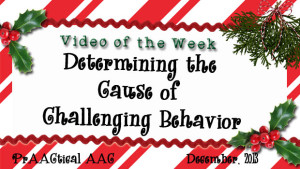
In many cases, SLPs start their careers without the knowledge or experiences that prepare them to support individuals with challenging behavior. This week, we feature a video by Virginia Commonwealth University Autism Center of Excellence entitled Function Matters! How to Determine Why a Student Demonstrates Problem Behavior. In this archived webinar, Dr. Carol Schall provides an overview of Functional Behavior Assessment, and discusses ways in which to use this information to build a behavior support plan. Note: You may be required to register before viewing this archived webinar. Link to video: http://www.vcuautismcenter.org/training/webcasts/webcast.cfm/207
Filed under: Video of the Week
Tagged With: Carole Schall, Challenging Behavior, FBA, Functional Analysis of Behavior, VCU
December 12, 2013
by Robin Parker -
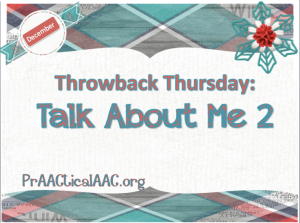
originally published December 13, 2012 We write about a lot of AAC strategies and we often give examples of different types of learners. Sometimes the learners we work with have more challenges than we explain. Lest you think, we do not see the really ‘challenging’ learners, we do, we really do. For those individuals with more challenges than most, sometime we are asked, well what do a few visual supports or AAC strategies do? What difference do they make? The truthful answer is A LOT. Here are a just a few recent examples from some really amazing families. When a mom is on the phone, a young adult brings in a timer and sets it so mom will get off the phone and go sit with her. When a communication book is forgotten on an emergency trip to the dentist, drawing on a napkin is enough to keep everyone calm... [Read More...]
Filed under: PrAACtical Thinking
Tagged With: Challenging Behavior, Complex Communication Needs, Visual Strategies
September 25, 2013
by Carole Zangari -
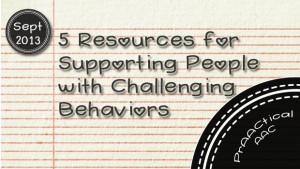
Need some help or new ideas for working with people who have challenging behaviors? Here are some resources to explore. 1. The Challenging Behavior Foundation is a UK-based organization with many good resources. You can check the archives of their newsletters here. 2. Wonderful instructional module on Functional Communication Teaching on the Autism Training Modules website. It takes time to work through this, but the information makes it worth the trouble. You may have to register (free) the first time you visit the site. 3.The National Professional Development Center on ASD has great information on Functional Communication Teaching, an approach with a strong evidence base. 4. The Functional Behavior Assessment Worksheet by PaTTAN 5. Our Pinterest board on Positive Behavior Support
Filed under: PrAACtical Thinking
Tagged With: Challenging Behavior, resources
May 17, 2013
by Robin Parker -
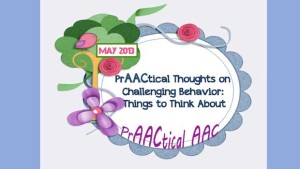
We have had several experiences in the last couple of weeks relating to concerns from SLP’s and educators about challenging behavior (dare we say it might be less structure, less predictability, less routines, or just plain tiredness because it is the end of the school year). Challenging behavior is hard… and disconcerting especially if you feel that you have little control over it (imagine how the learner feels- almost no one wants to be unhappy and out of control). However, there are so many strategies and supports that can improve the situation. It is often about getting back to basics (especially if end of the year issues play into the challenging behavior). The First 5 Questions to Ask: How Does the Learner Communicate? It is important that everyone has a way to communicate their own wants, needs, ideas, interests, and more. It is NOT good enough to just ‘know’ what someone... [Read More...]
Filed under: PrAACtical Thinking
Tagged With: behavior, Challenging Behavior, visual supports
March 15, 2013
by Robin Parker -
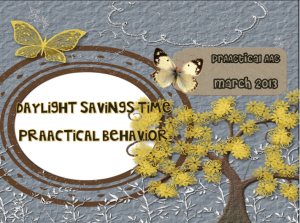
We have noticed that daylight savings time has been difficult for some of the learners that we know (for more about this see Karla Fisher’s ASD page). Sleep patterns seem to have been out of whack which in turn may lead to some re-emergence of behaviors that may pose challenges in speech-language sessions. However, instead of getting frustrated, this is the time to get more organized, teach more high priority communication (“need an extra break today”), and in some ways be more flexible. Be prepared to use the visual supports that keep learners focused, highly interested, and organized. By staying with the basics, there will be no need to sacrifice in AAC & language learning time. Remember to Use: Choice Boards– Give lots of choices. When we choose what we do, we are more likely to be interested and participatory. The session goals can remain the same but a... [Read More...]
Filed under: PrAACtical Thinking
Tagged With: Challenging Behavior, resources
February 3, 2013
by Carole Zangari -
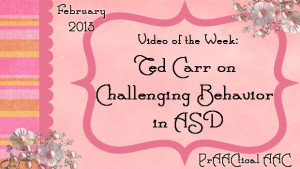
We are honored to share this talk by the late Dr. Ted Carr, who was a giant in the area of positive behavior support. In this guest lecture, he discusses basic underpinnings in challenging behavior in individuals with ASD and provides his vision of what it will take for major advancements in treatment to occur.
Filed under: Video of the Week
Tagged With: ASD, Challenging Behavior
December 13, 2012
by Robin Parker -
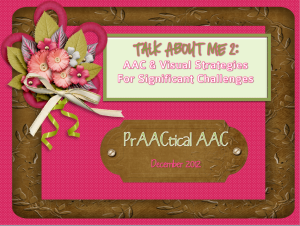
We write about a lot of AAC strategies and we often give examples of different types of learners. Sometimes the learners we work with have more challenges than we explain. Lest you think, we do not see the really ‘challenging’ learners, we do, we really do. For those individuals with more challenges than most, sometime we are asked, well what do a few visual supports or AAC strategies do? What difference do they make? The truthful answer is A LOT. Here are a just a few recent examples from some really amazing families. When a mom is on the phone, a young adult brings in a timer and sets it so mom will get off the phone and go sit with her. When a communication book is forgotten on an emergency trip to the dentist, drawing on a napkin is enough to keep everyone calm so that the dentist can... [Read More...]
Filed under: PrAACtical Thinking
Tagged With: Challenging Behavior, Complex Communication Needs, visual supports
October 3, 2012
by Robin Parker -
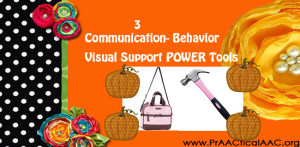
Behavior challenges tend to be a major concern of speech-language pathologists, parents, and educators alike. It is the area that is often most nerve wracking for many professionals and families. But once you get a set of strategies that help you have a plan, most challenging behaviors can be reduced. We like to think of challenging behaviors as opportunities 1: for the learner to practice understanding or expression of communication and language and 2: for facilitators/educators to use behavior strategies or learn new ones. So in order to be best prepared for challenging behaviors, start a Communication-Behavior Strategy Tool Kit. Here some powerful tools that will help ALL learners. 3 Power Tools for Communication & Behavior Choice Boards- helps give a learner power but under our guidelines and boundaries. With choice boards, a student learns more communication while having less power struggles/behavior challenges. Opportunity to teach choice making, expression... [Read More...]
Filed under: PrAACtical Thinking
Tagged With: AAC Strategies, Challenging Behavior, choice boards, first-then board, signs, visual supports
July 28, 2012
by Robin Parker -
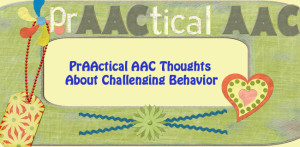
Some PrAACtical AAC thoughts about challenging behavior: I wonder if it is ok to say that we love seeing challenging behavior during speech-language therapy sessions or observations. Well, I said it, both of us do, because if we really ‘listen’ then we can figure out what to teach that will really help our students. We tend to prioritize our goals into High Priority and General Priority. Challenging behavior and the communication message behind it, definitely falls into high priority. This is because challenging behavior in students limits experiences, limits interaction, and overall limits opportunities for people to get to know you. Consider Challenging Behavior through Communication Glasses Is it really Challenging Behavior? behavior that is or can be destructive or hurtful. Examples include but are not limited to: hitting, biting, spitting, throwing, pounding, etc. (Note: we are not talking about poor eye contact or poor attention to task or even laughing... [Read More...]
Filed under: PrAACtical Thinking
Tagged With: Challenging Behavior, communication, positive behavioral supports, visual supports
July 28, 2012
by Robin Parker -
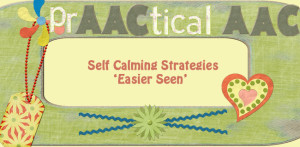
Throughout this month we focused on visual supports & strategies for positive behavior. We have discussed transition supports, environmental arrangements, and consequence mapping. As we wrap up, we don’t want to forget PrAACtical AAC strategies for self-calming. We like to think about self-calming like this- some weeks we need it more than others, some days we need it more than others. We all need self- calming strategies. Whether we vent to a friend, go for a run, knit, take deep breaths, or get a glass of wine (although we are not advocating this), we all use self-calming strategies. It makes a huge difference. Sometimes though helping our students self-calm at times may seem “easier said than done”, but we know it truly is ‘easier when SEEN‘. Self-calming strategies can help before, during, and after behavior challenges . We will often teach and use self calming strategies if we know a potentially stressful situation will... [Read More...]
Filed under: Strategy of the Month
Tagged With: Challenging Behavior, resources, Self-Calming, strategies, visual supports









